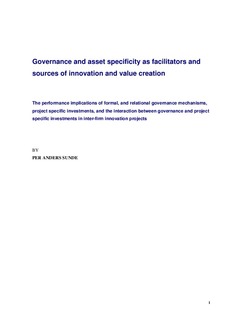| dc.description.abstract | Drawing on transaction cost theory and relational exchange theory, this dissertation examines the different performance effects of formal and relational governance mechanisms, project specific investments, and the interaction between governance and project specific investments in inter-firm innovation projects. The following four performance dimensions are studied: goal attainment, value creation potential for the customer and the contractor, and innovative performance.
The model and hypotheses were developed and empirically tested on a sample of 320 inter-firm innovation projects in the Norwegian petroleum industry. Data was collected based on a survey of approximately 800 project managers on the supplier side of the dyad. The oil companies operating on the Norwegian Continental Shelf (NCS) were the customers in all projects.
Generally, most of our hypotheses were supported. First, the interaction effects of formalization and project specific investments on all kinds of performances were positive, thus highly supportive of transaction cost theory. In this respect, our results indicate that as the level of project specific investments increase, the positive safeguarding effects of formalization increase more than the potential negative effects related to ‘bureaucratization’ costs, resulting in increased value creation potential and innovative performance. Second, the interaction effects of relational norms and project specific investments on performance were more ambiguous; some hypotheses were not supported, and others only partially supported. That is, the safeguarding properties of relational norms seem to be marginal or insignificant, resulting in inferior performance. Third, the direct effects of both relational norms and project specific investments on all kinds of performance are generally positive. The direct effects of formalization, on the other hand, are more complex and highly contingent on the performance dimensions. In particular, formalization seems to be effective in relation to ‘goal attainment’ and correspondingly ineffective in relation to innovative performance.
Finally, theoretical and managerial implications are discussed and suggestions for future research are indicated. | en |
